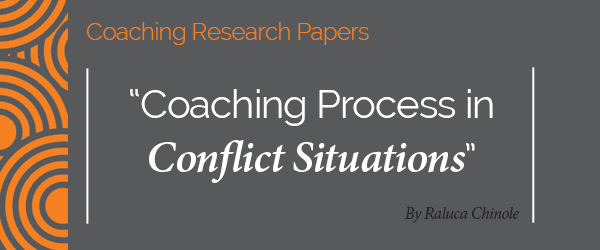 Research Paper By Raluca Chinole
Research Paper By Raluca Chinole
(Executive Coach, ROMANIA)
This case study is based on my project in a multinational company were I had the chance to coach teams. Initially I was asked to run a Conflict management workshop for a department working under pressure.
Context:
Back in 2011 when the financial crises stroked, this department was responsible on one hand of company’s budget and on the other hand they were forced by the economic environment to relax the credit policy for its clients.
Inevitably the pressure among members of this department was high and conflicts started to arise. Another issue that didn’t help too much was a new manager of the department. He was promoted from the department, but he needed a transition period from an operational role to a leader role.
Managers play a crucial role in identifying and managing workplace disputes at an early stage. To this end, managers can be both the solution to, and the cause of workplace disagreements. Management style of managers could contribute to stress within their team or department
Conflict Management approach
Conflict occurs with two or more people who, despite their first attempts at agreement, do not yet have agreement on a course of action, usually because their values, perspectives and opinions are contradictory in nature.
Conflict is inevitable and often necessary when forming high-performing teams because they evolve through “form, storm, norm and perform” periods. Getting the most out of diversity often means addressing contradictory values, perspectives and opinions. Conflict is often needed. But not when represents a danger for company interests.
It helps to raise and address problems, energizes work to be focused on the most important priorities, helps people “be real” and motivates them to fully participate, helps people learn how to recognize and benefit from their differences.
There is no shortcut to managing conflict. The key is to understand and establish good working relationships with your supervisors and team. Every situation of conflict is an opportunity for your team to grow, learn and work even more effectively if it is handled appropriately.
For any organization to be effective and efficient in achieving its goals, the people in the organization need to have a shared vision of what they are striving to achieve, as well as clear objectives for each team / department and individual. You also need ways of recognizing and resolving conflict amongst people, so that conflict does not become so serious that co-operation is impossible. All members of any organization need to have ways of keeping conflict to a minimum – and of solving problems caused by conflict, before conflict becomes a major obstacle to your work.
Conflict management is the process of planning to avoid conflict where possible and organizing to resolve conflict where it does happen, as rapidly and smoothly as possible.
A very important part is to make the people involved to understand what difficult conversations means, to learn how to deal with emotions, how to be assertive and how to keep communication open. Often, when people are in conflict are limiting the conversation to a very superficial level. This is not helping at all solving the conflict and move on. It only generates frustration and luck of fulfillment.
After the first stage of the project consisting in a Conflict management workshop we discovered we need also a coaching approach to complete the process.
The coaching part was meant to address the “HOW to do it part”. The members of the team were now, aware of the origins of their problems, they started to understand the signs of a conflict, the consequences of it, the importance of the emotions and their luck of communication.
It was missing one important step – how to change their behavior in a smooth way, acceptable for each of them and in the same time efficient for the whole team.
We decided that only a coaching program could meet those requirements and we implemented one.